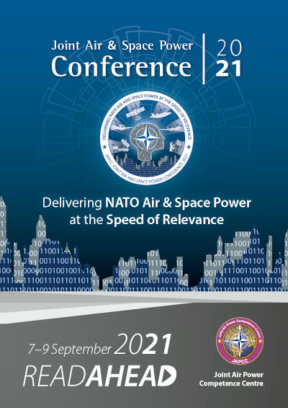Introduction
Many of the most important activities supporting the planning and execution of military operations occur in what has been recently recognized as NATO’s highly dynamic and rapidly evolving fifth operational domain, Space. Space-based capabilities are a critical element of all modern militaries. The escalation in Space-related activities has resulted in Space becoming increasingly congested and competitive, with Space-based capabilities being potentially more vulnerable and the domain becoming a priority confrontational area for strategic competitors. To counter threats to Space-based capabilities, it is essential to develop a higher level of Space Domain Awareness and increase the resilience of national Space-based capabilities providing data, products, and services to the Alliance in support of operations. This will require the ability to rapidly replace damaged or inoperable satellites, as well as quickly integrate new capabilities. Plug-and-play ability and modularity are examples of harmonizing these efforts, and of a high level of standardization, fundamental to both reducing the time and cost of production and to altering the decision-making in NATO operations. These new approaches are crucial to the Alliance’s ability to maintain access to Space-based data, products, and services, and serve as a strong deterrent to both peer- and near-peer potential adversaries.
Milestones and Progress
While NATO has recently made strides regarding Space by creating an Overarching Space Policy, recognizing Space as an Operational Domain in 2019, establishing a Space Centre in October 2020, and authorizing the creation of a Space-focused Centre of Excellence in January 2021, significant strides have also been made within Alliance Nations.
‘The United States had a US Space Command from 1985 until 2002 when … functions were absorbed by US Strategic Command.’1 On 18 December 2019, the US re-established its Space Command ‘to focus on the protection of US Space assets and to strengthen the military’s posture in Space as adversaries develop more advanced anti-satellite weapons.’2 This was followed with ‘legislation creating the first new armed service since 1947 – the US Space Force’3 on 20 December 2019. The focus of the law was to create a ‘service that will be totally focused on organizing, training and equipping Space Force.’4 With the creation of the world’s first independent Space Service, the US acknowledged its ‘military Space forces must be skilled managers of risk, always seeking mission accomplishment at the speed of relevance while recognizing that perfection is often the enemy of good-enough’.5
In early 2020, the UK established ‘the Space Directorate, one half of the team specializing in policy and strategy, with the other half being capability focused – based within the MOD in Whitehall’.6 This was followed by the establishment of ‘Space Command, under its own two-star commander, with a focus on doing the day-to-day business of Space. The training of people and generation of expertise, the capability management – delivering programmes and bringing new Space capability to the frontline – and the actual operations of Space, such as managing capabilities we have in-orbit, or running the UK Space Operations Centre.’7 The current plan is ‘direction from the National Space Council will flow through the Space Directorate in MOD Head Office to Space Command and other relevant elements of Defence. It is envisaged that Space Command will interact with the UK Space Agency, as required, to deliver joint national Space capability’.8
On 11 September 2020, the French Air Force was officially redesignated ‘the French Air and Space Force, completing a process initiated by President Emmanuel Macron in July 2019 when he announced the creation of a Space command’.9 This follows the 2010 creation of a French Joint Space Command, ‘a rather modestly staffed structure but highly positioned in the institution and soon to become a key step in helping Space find its way in the new military thinking’.10 The French Space Command is in the process of transitioning ‘from a mere 30 officer-’Joint Space Command’ to a more than 200-uniformed military-organization, before gaining more personnel over time, possibly up to several hundreds’.11 This recognition of ‘the increased French military dependency on Space and the perception of a more hostile environment must be seen as one of the key reasons behind this reorganization’.12
From Italy, in the Autumn of 2019, ‘the undersecretary of Defense, Angelo Tofalo, and the Chief of Staff of the Italian Air Force, Gen. Alberto Rosso, said that everything is ready to establish the ‘General Space Office of Italian Armed Forces.’ The first step towards the formation of a Space Command.’ Indeed, those first steps have been achieved with the creation of the Italian General Office for Space within the Italian Air Force and consisting of two offices: one focused on innovation and a second on policy and operations. ‘As part of the Air Force General Staff, the General Office for Space is configured as the organizational element that manages activities and needs in the Space sector of interest to the Air Force, coordinating both with the internal bodies of the Armed Force.’13
NATO Integration of Space-derived Data, Products, and Services (DPS)
As mentioned earlier, last autumn NATO approved the creation of a NATO Space Centre, ‘which will serve as a hub for Space-related information, expertise, and activities and directly liaise with the several nations providing Space DPS. Once operational and fully staffed, it will provide greater ability for NATO to coordinate requests for Space DPS’.14 How the Space Centre, and by extension NATO, will collect, merge, and share relevant Space DPS, particularly regarding Space Domain Awareness, across the Alliance remains to be developed.
Access to and use of Space is currently a very uneven playing field. Some nations are quite advanced in their ability to reach and utilize Space-based capabilities, while others access services through commercial providers only. Similarly, while NATO utilizes Space-based capabilities the associated DPS which they provide are shared by nations who retain authority over the capabilities themselves. NATO must consider how to integrate DPS from the providing nations with the whole Alliance, while the nations who own Space capabilities will execute authorities related to operating those capabilities. This means that NATO must focus on the integration of DPS while the nations focus on maturing organizations, policies, doctrine, exercises, and Space professional personnel.
As Alliance Nations develop and implement policies and strategies for Space operations, NATO must ensure it has access to the DPS those operations generate. At the same time, NATO must seek to develop policies and strategies which maximize the benefit of the nations’ expanding capabilities, without seeking to mimic policies and strategies for capabilities which currently, and for the foreseeable future, reside within the nations. NATO seeking an appropriate approach to Space development, compatible to the development within the Alliance, will enable NATO to benefit from Space Power at the speed of relevance.
Additional Articles
This section presents nine related articles which will introduce various ideas and issues related to the Operational Domain of Space, and the different challenges NATO faces therein. The ideas expressed in this article are meant to prepare those attending the 2021 Joint Air & Space Power Conference for the panel discussion on Space:
- The first article, NATO Space: International Cooperation is Key to Spacepower, by General John Raymond (US Space Force), provides a senior leader’s perspective regarding the unique challenges facing the burgeoning Space Domain and the crucial role cooperation will play.
- In The Role of Space Domain Awareness: Space Asset Resilience thru Protection, Captain Alessio Di Mare (IT Air Force) discusses the importance of Space Domain Awareness for NATO to continue to have access to Space-derived data, products, and services.
- The next paper, Modular Satellite Manufacturing to Enhance Space Assets Resiliency is written collectively by Mr Tal Azoulay, Ms Giulia Federico, and Mr Ran Qedar. This paper focuses on approaching the manufacturing of satellites in a modular ‘plug and fly’ manner to enable greater resiliency across satellite constellations.
- Next, we turn to Leveraging Responsive Space & Rapid Reconsti tution by Mr Bret Perry and Mr John Fuller. This paper explores the b enefits of responsive launch capability, especially regarding small satellite constellations.
- In Chinese ‘High-Risk’ Corporate Space Actors Dr Jana Robinson discusses Space-related economic issues. Specifically, she describes the extend to which Chinese corporations have permeated around the globe as well as implications and recommendations for the Alliance.
- The section is finished by the JAPCC’s own Lieutenant Colonel Tim Vasen (GE Air Force) who provides From Satellite Generations to a Continuous Evolution. This work examines a shift in approach to intelligence satellite constellation design, from a generational approach to a continuous improvement of capability with each satellite launched.












